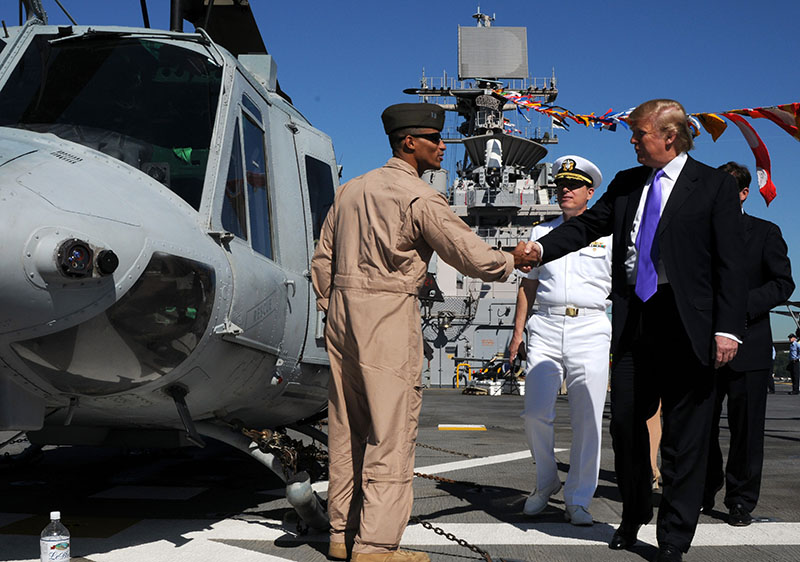As we seek to digest and make sense of Tuesday’s historic election, the maritime industry can find reasons to be both concerned and relieved with the results.
There are many issues of importance to the shipping sector that remain unclear in President-elect Trump’s policies, as he offered no specifics during his campaign about how he would act on issues like the Jones Act, Coast Guard funding, vessel discharge, port and waterways modernization, recapitalizing the dwindling merchant fleet and shipbuilding. And we have no clue who he will appoint to key maritime positions in his new administration, such as the Transportation Secretary (that department oversees infrastructure and maritime policies), Secretary of Energy, and the head of the Maritime Administration.
But we can get an idea by making connections between what he has said on broader policy issues to maritime shipping by looking at his statements on energy, defense, transportation, trade, infrastructure and environmental regulation.
On the positive side are his remarks on defense, the environment, energy and infrastructure. He has talked about building up the Navy (good for shipbuilding), rolling back regulations (he has promised to revive the coal industry, which some say is impossible, and roll back some Obama-era environmental rules under which oil and gas producers have chafed), expanding U.S. oil and gas production (good for offshore production and waterways commerce), and improving America’s crumbling infrastructure (he highlighted this in his acceptance speech).
Of all these issues, a bump in infrastructure seems to be the most plausible, if, of course, Trump and Congress can agree on how to fund it. In his post-election speech Trump said: "We are going to fix our inner cities and rebuild our highways, bridges, tunnels, airports, schools, hospitals. We're going to rebuild our infrastructure, which will become, by the way, second to none. And we will put millions of our people to work as we rebuild it.”
He has pledged to act on infrastructure within his first 100 days in office, and hopefully his background as a developer and knowledge of construction will be helpful in this regard.
Notice that he didn’t mention waterways in the list of must-do repairs, but we’re used to that. No previous president has highlighted waterways in national speeches, but when bills get written in Congress, waterways usually get their due, thanks to an active industry voice and friends on Capitol Hill.
In fact, improving infrastructure is a topic that both Democrats and Republicans agree on, and it was one of the few areas of common ground between Clinton and Trump during the campaign. Members of Congress were quick to seize on this after the election, offering it as an example of a unifying issue in an atmosphere of deep discord.
“With the results of Tuesday’s historic election now coming into focus, we have a unique opportunity to begin this work immediately by embracing innovative ideas and approaches to improving our infrastructure,” Rep. Bill Shuster, R-Pa, chairman of the House Transportation and Infrastructure Committee, said in a statement on Thursday.
Congress has been working on ways to improve infrastructure for a number of years but always falls short when it comes to funding. Big strides have been made, however, in funding inland waterways improvements, thanks mostly to the barge industry agreeing to an increased fuel tax to help pay for the work.
On the negative side, there are several areas of concern for the shipping industry, based mostly on the unknowns of how Trump’s broad policy statements might be put into practice. One big concern is his anti-trade rhetoric. Trump has said he would tear up existing trade agreements and slap tariffs on Chinese imports.
This doesn’t sit well with bluewater container shipping, as the U.S. economy is still the major driver of international trade and the industry is already suffering from weak demand and overcapacity. It would also affect brownwater commodity movements, as the two industry segments are often linked, and more and more U.S. domestic commodity movements on the inland system, especially grain and coal, are going to export.
Then there’s Cuba. President Obama has moved to normalize relations with the communist nation after more than 50 years of Cold War tensions. The move has been a good opportunity for ports and the cruise industry. An eventual lifting of the trade embargo, which can only be done by Congress, is the next step that many U.S. ports are hoping for. But Trump has thrown this progress into an uncertain abyss. He has made some conflicting statements about Cuba, but most recently, in swing through Florida just before the elections, he promised that his administration would return to a hardline policy, oppose lifting the embargo, and reverse Obama’s executive order on Cuba.
And lastly, should we mention the wall that he wants to build on the border with Mexico? This one is pretty hard to imagine — 2000 miles long and fraught with all kinds of construction, legal, humanitarian and logistical challenges. But should it ever come to pass, it would most likely involve the U.S. Army Corps of Engineers, the folks who keep our inland waterways system humming. I can’t imagine that this would be a good thing for the Corps or for the waterways, as that agency is already struggling to keep up with the demands of a crumbling inland system, among a host of other national and international responsibilities.





